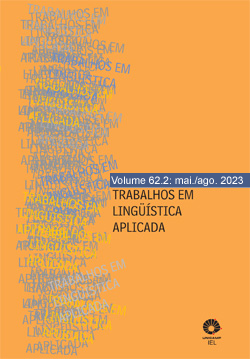Abstract
Subtitling and audiovisual translation (AVT) in general, as language practices, play a crucial role in shaping social imaginary and contributing to the construction of identities. But far too little attention has been paid to the translation of documentaries, especially those produced in the so-called “global” South and translated into other languages, such as English. Therefore, this paper aims to gain a further understanding of translating documentaries, particularly looking at subtitles from a transnational perspective intertwining translation and feminist studies. We will elaborate on the importance of translators’ careful listening as a critical factor in the translation of documentaries produced based on personal narratives. The object of analysis comprises excerpts of subtitles, audio recordings, and frames extracted from Brazilian documentaries chronicling the lives and work experiences of waste pickers (including poor, Black women) set in contexts of extreme poverty. The research proposes a parallel between the story of Pandora and its many translations and interpretations and the representation of women in the subtitled versions of the documentaries, thus suggesting that such a theoretical perspective can shed light on how women’s words and works can become fertile in their difference, and perhaps their deviance.
References
AUTHIER-REVUZ, J. Palavras incertas: as não-coincidências do dizer. Campinas: Editora UNICAMP, 1998.
BOSSEAUX, Charlotte. Translating Gender-Based Violence Documentaries:
Listening Ethically to the Voices of Survivors. In: JI, Meng; LAVIOSA, Sara (Eds.). The Oxford Handbook of Translation and Social Practices, 2020, p. 84-108. Available at: https://doi.org/10.1093/oxfordhb/9780190067205.013.35
BOUVIER, Mathilde; VANEK, Joann; ROUBAUD, François. Informal Workers in Brazil: A Statistical Profile, 2022. Available at: https://www.wiego.org/publications/informal-workers-brazilstatistical-profile.
CASTRO, Olga; ERGUN, Emek. (Eds.). Feminist Translation Studies: Local and Transnational Perspectives. New York: Routledge, 2017.
COSTA, Cláudia Moraes da; PATO, Cláudia. A constituição de catadores de material reciclável: a identidade estigmatizada pela exclusão e a construção da emancipação como forma de transcendência. In: PEREIRA, Bruna Ceistina Jaquetto; GOES, Fernanda Lira (Orgs.). Catadores de Materiais Recicláveis: um encontro possível. Rio de Janeiro: IPEA, 2016. p. 101-123.
CRÉPON, Marc; KEOHANE, Elizabeth Geary; KEOHANE, Oisín. The Invention of the Idiom: The Event of the Untranslatable. Paragraph, Vol. 38, No. 2, Translation and the Untranslatable, 2015, p. 189-203.
ESPASA, Eva. Myths about documentary translation. In: ORERO, Pilar (Ed.). Topics in Audiovisual Translation. Amsterdam: John Benjamins, 2004. p.183-197
FLOTOW, Luise von. Conferência 1 — Prof. Dra. Luise Von Flotow. Youtube. Disponível em: https://www.youtube.com/watch?v=VCAnwjG3I-c. 1:29:28, 2021. Acesso em: ago, 2022.
FLOTOW, Luise von; JOSEPHY-HERNÁNDEZ, D. Gender in audiovisual translation studies. In: PÉREZ-GONZÁLEZ, L. (Ed.). The Routledge Encyclopedia of Translation Studies, London & New York: Routledge, 2018. pp. 296-311.
FLOTOW, Luise von. Translation and gender: translating in the 'era of feminism' (Perspectives on translation). Ottawa: University of Ottawa Press, 1997.
FREUD, Sigmund. (1955[1919]) The ‘uncanny’. In: J. Strachey (ed.), The Standard Edition of the Complete Psychological Works of Sigmund Freud, vol. 17, p. 219-56
JESUS, Carolina Maria de. Child of the dark: the diary of Carolina Maria de Jesus. Trad. David St. Clair. Nova York: New American Library, 1962.
KILOMBA, Grada. Memórias da Plantação: Episódios de Racismo Cotidiano. Rio de Janeiro:
Cobogó, 2008.
KILOMBA, Grada. Plantation Memories: Episodes of Everyday Racism. 2 ed. Munster: UNRAST, 2010.
LIMA, Francisco de Paula Antunes, et al. (Coord.). Atlas Brasileiro de reciclagem. São Paulo: Associação Nacional dos Catadores e Catadoras de Materiais recicláveis, 2022
LINS, Consuelo. O documentário de Eduardo Coutinho: televisão, cinema e vídeo. Rio de Janeiro: Jorge Zahar, 2004.
LITTAU, Karin. Pandora's Tongues. TTR, 13(1), 2000, p. 21-35. Available at: https://doi.org/10.7202/037391ar
MEDINA, Martin. Scavenger cooperatives in Asia and Latin America. Resources, Conservation and Recycling 31, 2000, p. 51-69.
MIURA, Paula Cerantola. Tornar-se catador: uma análise psicossocial. 2004. Dissertação (Mestrado) – Pontifícia Universidade Católica de São Paulo, São Paulo, 2004. Available at: http://www.sapientia.pucsp.br/tde_arquivos/25/TDE-2009-09-09T13:34:15Z8342/Publico/Paula%20Miura%20completa.pdf. Acesso em: Ago. 2023.
MULVEY, Laura. Fetishism and Curiosity. Bloomington: Indiana University Press, 1996.
NICHOLS, Bill. Introduction to Documentary, Third Edition. Indiana University Press, 2017.
SANT'ANA, Diogo; METELLO, Daniela. Reciclagem e inclusão social no Brasil: balanço e desafios. In: PEREIRA, Bruna Ceistina Jaquetto; GOES, Fernanda Lira (Orgs.). Catadores de Materiais Recicláveis: um encontro possível. Rio de Janeiro: IPEA, 2016. p. 21-43.
SOUZA, Marco Aurélio de. Pode Estamira falar? O cinema documentário brasileiro e a voz do sujeito subalterno. Revista Arredia, Dourados, MS, Editora UFGD, v.4, n.6, 2015, p.68-79.
UNITED NATIONS. Gender, climate and finance: How investing in women can help combat climate change. 2022. Available at: https://www.unepfi.org/themes/climate-change/gender-climate-and-finance-how-investing-in-women-can-help-combat-climate-change/. Acesso em: 15 Jun. 2023.
Filmography
BOCA de Lixo. Direção: Eduardo Coutinho. Brasil: Centro de Criação de Imagem Popular (CECIP), 1993. (50 min.).
ESTAMIRA. Direção: Marcos Prado, José Padilha. Brasil: Riofilme, 2004. (1:55 min).
ILHA das Flores. Direção: Jorge Furtado. Brasil: Casa de Cinema de Porto Alegre, 1989 (13 min.).
LIXO Extraordinário. Direção: Lucy Walker. Brasil: 02 Filmes, 2009. (99 min.).
O Lixo Nosso de Cada Dia. Direção: Fernanda Barban. Brasil: Casa Rosa Filmes, 2020. ((38 min.).
RESTOS. Direção: João Batista de Andrade. Brasil: Grêmio da Faculdade de Filosofia da USP, 1975. (10 min.).

This work is licensed under a Creative Commons Attribution 4.0 International License.
Copyright (c) 2023 Fernanda Boito de Melo Silva, Luise von Flotow


